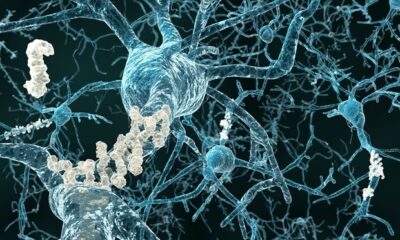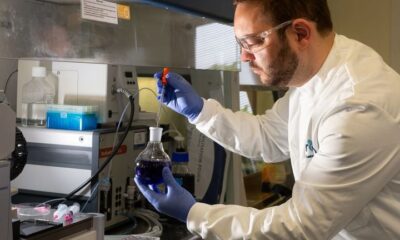Health
New Blood Test Promises Faster, Affordable Alzheimer’s Detection

A new blood test developed by researchers at U.C. San Diego could significantly enhance the early detection of Alzheimer’s disease and related dementias. This innovative test aims to provide a faster, cheaper, and less invasive method to identify cognitive decline by measuring specific proteins in the blood linked to brain inflammation and nerve cell damage.
Current diagnostic methods for Alzheimer’s typically rely on brain scans that can take weeks or months to confirm the disease. The new blood test focuses on surges in particular proteins, comparing these levels with patients’ symptoms to potentially expedite the diagnostic process. Currently, the only approved blood test for Alzheimer’s in the United States is the Lumipulse test, which costs between $500 and $1,200 and is not covered by insurance, according to the Fisher Center for Alzheimer’s Research Foundation.
Potential for Improved Accessibility and Accuracy
Dr. Freddie Márquez, a postdoctoral scholar at the School of Medicine, emphasized the significance of this study, stating, “This study highlights the promise of blood-based biomarkers as a more accessible and scalable tool for understanding cognitive decline, particularly in populations that have been underserved by traditional methods.” While the researchers acknowledge the potential of blood-based biomarkers, they also caution that further validation is necessary before these tests can be widely adopted.
“It’s important to note that there’s still a lot we don’t know about the utility of blood-based biomarkers for Alzheimer’s detection,” Dr. Márquez added. He stressed that while these tests could strengthen a doctor’s diagnosis, they should complement existing methods instead of replacing them.
Implications for Public Health
Alzheimer’s disease currently affects approximately 7.2 million Americans, a number projected to rise to nearly 13 million by 2050. Early detection is crucial, as it provides patients and their families with more opportunities to plan for the future. Most treatments for Alzheimer’s are most effective during the early or middle stages of the disease, making timely diagnosis imperative.
For their study, researchers analyzed blood tests from over 5,700 Hispanic adults aged 50 to 86 years. This demographic is particularly significant, as Hispanic Americans have a higher risk of developing Alzheimer’s compared to other groups. Factors contributing to this increased risk include higher rates of diabetes, stroke, and heart problems, which are more prevalent in this population.
As the medical community continues to explore innovative solutions to enhance Alzheimer’s detection, the findings from this study could lead to more accessible and effective diagnostic tools, ultimately improving outcomes for millions affected by this debilitating condition.
-

 World2 months ago
World2 months agoCoronation Street’s Shocking Murder Twist Reveals Family Secrets
-

 Entertainment2 months ago
Entertainment2 months agoAndrew Pierce Confirms Departure from ITV’s Good Morning Britain
-

 Health5 months ago
Health5 months agoKatie Price Faces New Health Concerns After Cancer Symptoms Resurface
-

 Health2 weeks ago
Health2 weeks agoSue Radford Reveals Weight Loss Journey, Shedding 12–13 kg
-

 Entertainment6 months ago
Entertainment6 months agoKate Garraway Sells £2 Million Home Amid Financial Struggles
-

 Entertainment5 months ago
Entertainment5 months agoAnn Ming Reflects on ITV’s ‘I Fought the Law’ Drama
-

 World3 months ago
World3 months agoBailey Announces Heartbreaking Split from Rebecca After Reunion
-

 Entertainment2 months ago
Entertainment2 months agoDavid Jason and Nicholas Lyndhurst Eye Reunion for Only Fools Anniversary
-

 Entertainment3 months ago
Entertainment3 months agoCoronation Street Fans React as Todd Faces Heartbreaking Choice
-

 Entertainment2 months ago
Entertainment2 months agoBradley Walsh Sparks Strictly Come Dancing Hosting Speculation
-

 World3 months ago
World3 months agoEastEnders’ Nicola Mitchell Faces Unexpected Pregnancy Crisis
-

 Entertainment2 months ago
Entertainment2 months agoTwo Stars Evicted from I’m A Celebrity Just Days Before Finale





















